七年级英语Life-history课件1
七年级英语Lifehistory课件4
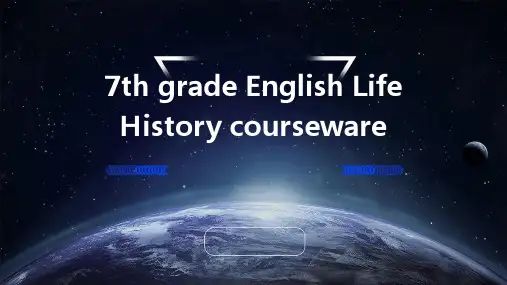
Use scenarios to create a real-world context for students to understand the content. This can involve using scenarios from their own lives or creating relevant scenarios.
Scenario-based learning
Utilize objects that are interactive and engaging for students. These objects can be physical or digital, such as props, models, or digital simulations.
结构清晰
课件的界面布局简洁明了,颜色搭配舒适,字体大小适中,使得学生在使用过程中不易产生视觉疲劳。
布局合理
课件中融入了多种互动元素,如问答、选择题和填空题等,有助于激发学生的学习兴趣和积极性。
互动性强
Courseware structure and layout
课件对课程中的重点内容进行了明确标注和详细解释,有助于学生加深对重点知识的理解和记忆。
Notes and suggestions
Summary and Outlook
06
The courseware focuses on enhancing students' language skills in English, including reading, writing, speaking, and listening. Through various activities and exercises, students are able to improve their language proficiency and communication abilities.
2020春七年级英语下册Module9LifehistoryUnit1Heleftschooland
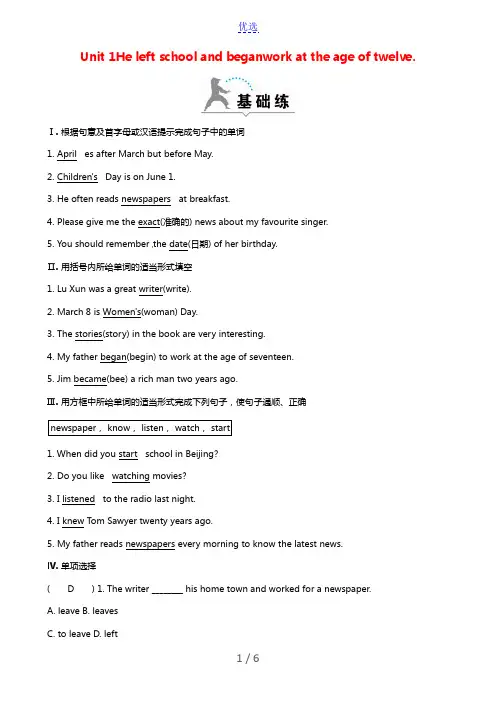
Unit 1He left school and beganwork at the age of twelve.Ⅰ. 根据句意及首字母或汉语提示完成句子中的单词1. April es after March but before May.2. Children's Day is on June 1.3. He often reads newspapers at breakfast.4. Please give me the exact(准确的) news about my favourite singer.5. You should remember the date(日期) of her birthday.Ⅱ. 用括号内所给单词的适当形式填空1. Lu Xun was a great writer(write).2. March 8 is Women's(woman) Day.3. The stories(story) in the book are very interesting.4. My father began(begin) to work at the age of seventeen.5. Jim became(bee) a rich man two years ago.Ⅲ. 用方框中所给单词的适当形式完成下列句子,使句子通顺、正确newspaper, know, listen, watch, start1. When did you start school in Beijing?2. Do you like watching movies?3. I listened to the radio last night.4. I knew Tom Sawyer twenty years ago.5. My father reads newspapers every morning to know the latest news.Ⅳ. 单项选择( D ) 1. The writer ________ his home town and worked for a newspaper.A. leaveB. leavesC. to leaveD. left(A) 2. I like the novels(小说) written by Mark Twain ________.A. as wellB. as well asC. eitherD. also(C) 3. We often plant trees in ________.A. SeptemberB. DecemberC. MarchD. August(C) 4. Can you help me ________ the truth?A. findB. look forC. find outD. look at(D) 5. Mark Twain b ecame very famous ________.A. in the 1860B. in 1860sC. in the 1860s'D. in the 1860sⅤ. 根据汉语意思完成下列句子,每空一词1. 我们必须查明他住在什么地方。
Module9Lifehistory听说课-天津市空中课堂外研版七年级英语下册课件(共35张PPT)
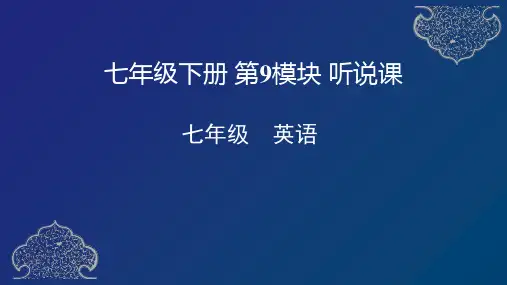
2) Did Betty read Tom Sawyer? Yes, she did. 3) Was Mark Twain his real name? No, it wasn’t.
find out 表示“找出,查明,弄清” 例如:You will find out the true facts soon.
学习教材 4. Read and answer the questions.
1) Was Mark Twain English or American? He was American.
by在此处表示“由......创作”
学习教材 4. Read and answer the questions.
What festival is it?
Children’s Day
What festival is it? Teachers’ Day
What festival is it? National Day
What festival is it? Christmas
What festival is it?
November 1941.
学习教材 2. Think about these questions.
Who’s the man in the picture? What did he do? Was he English or American? Do you know the book Tom Sawyer?
2019春七年级英语下册Module9Lifehistory模块话题微写作课件新版外研版
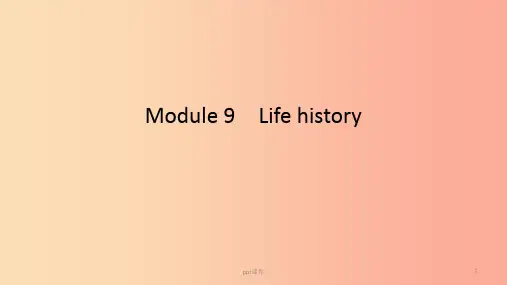
ppt课件
4
6.He became a successful actor and began to write plays.他成了一名成功的演员,并开始写剧本。 7.You can visit the theatre today,but it isn’t the same building.今天你还可以去参观那个剧院,但是 它不再是当年的那个建筑了。 8.William Shakespeare died at the age of fifty-two.威廉·莎士比亚52岁去世。 9.You can still see his plays in English and in many other languages.你现在依然可以看见他的戏 剧用英文和其他许多语言在演出。 10.He’s famous around the world.他举世闻名。
Module 9 Life history
ppt课件
1
本模块的话题是“介绍某人的生平”,内容可包括某人的出生时间和地点、成长经历、婚姻状 况、家庭情况、工作情况、爱好等。在具体的写作中,学生应做到以下几点:
1.能运用一般过去时叙述某人之前的生活状态; 2.能熟练运用一般过去时的各种句式介绍一个人的生平; 3.能熟练使用英语中的年份、月份等表达时间的词汇。
ppt课件
5
根据汉语意思完成句子,每空一词 1. and began to work at the age of 12.
2.起初,他决定成为一名医生。
At first ,he decided to be a doctor.
3.1984年他出生在安徽的农村地区。
He was born in the countryside/village in Anhui in 1984. 4.他因为工作努力而变得有名。
2020-2021学年外研版七年级下册英语习题课件Module9
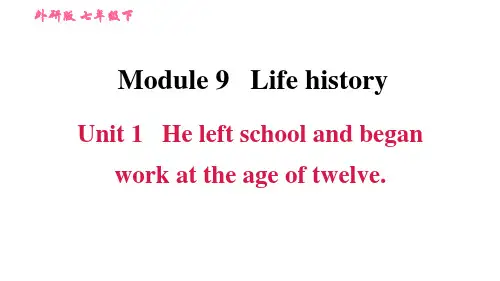
Module 9 Life history
Unit 1 He left school and began work at the age of twelve.
习题链接
先练后背 提示:点击 进入习题
1 become
6 National Day
2 real
7 Teachers' Day
借助did构成问句。
课后巩固
20. 儿童节在六月一号。 C__h_i_ld_r_e_n_'s___D__a_y__ is ____o_n___ ___J_u_n_e__ 1st.
课后巩固
五、按要求完成句子 21. Teachers' Day is on September 10th. (对画线部分提问)
__W__h__en__ ____i_s___ Teachers' Day?
先练后背
9. 他十二岁时离开学校开始工作。 He left school and began work____a_t__ ___t_h_e__ ___a_g_e__ ___o_f ___ twelve.
先练后背
10. 在19世纪60年代,他用了马克·吐温这个名字,并且 变得非常出名。 He took the name Mark Twain and became very famous ____i_n___ ____t_h_e__ ___1_8_6_0_s_.
题组专训
10. 现在是二十一世纪二十年代。 Now it's _____in___ ____t_h_e__ __2_0_2_0_s__.
课后巩固
一、单项选择
1. Our National Day is on ___C___ first day in _______
2019春外研版七年级英语下册作业课件:Module 9 Life history Unit 1 第一课时
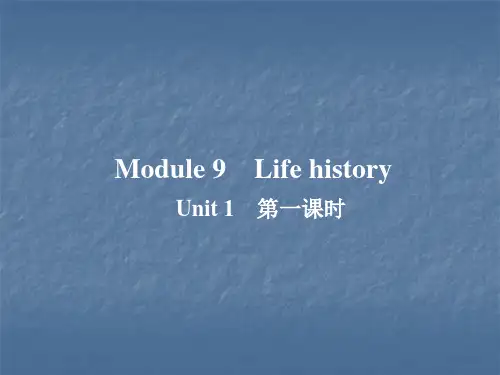
三、用方框中所给词的适当形式填空,每词限用一次。
December in Harbin. 11.It's very cold in
12.—Where does your father work?
—He works for an English newspaper . 13.—What's the —It's June 6. 14.We call him Xiaodong,but it isn't his
8.Oscar Wilde was a great writer (write) in the world. 9.Those women hope to stay at home onWomen's (woman) Day. 10.The boy became (become) a middle school student one year ago.
二、用括号内所给词的适当形式填空。 6.On Children's (child) Day,the children always have a good time. 7.—Where did you go yesterday? —My parents
took
(take) me to the zoo.
the
1860s .
大多数孩子在七岁时开始上学。
►Spring
Festival
is
in
January
or
February.春节在一月或二月。 表示“在……月份”时,应用介词in,表示“ 星期几”时,应用介词on。 【归纳】January 一月;February 二月;
March 三月;April 四月;May 五月;June 六月
外研版七年级英语下册电子课本课件【全册】
外研版七年级英语下册电子课本 课件【全册】目录
0002页 0088页 0119页 0202页 0280页 0319页 0381页 0442页 0529页
封面/前言/目录 Module 2 What can you do? Module 4 Life in the future Module 6 Around town Module 7 My past life Module 9 Life history Revision B 语法 语音
Module 9 Life history
外研版七年级英语下册电子课本课 件【全册】
Module 10 A holiday journey
外研版七年级英语下册电子课本课 件【全册】
Revision B
外研版七年级英语下册电子课本课 件【全册】
课文注释
外研版七年级英语下册电子课本课 件【全册】
语法
外研版七年级英语下册电子课本课 件【全册】
单词外研版Leabharlann 年级英语下册电子课本课 件【全册】
Module 6 Around town
外研版七年级英语下册电子课本课 件【全册】
Revision Module A
外研版七年级英语下册电子课本课 件【全册】
Module 7 My past life
外研版七年级英语下册电子课本课 件【全册】
Module 8 Story time
外研版七年级英语下册电子课本课 件【全册】
外研版七年级英语下册电子课本课 件【全册】
Module 3 Making plans
外研版七年级英语下册电子课本课 件【全册】
Module 4 Life in the future
七年级英语下册Module 10 Life history Unit课件外研版
1.Which month is the first in a year?
2. Which month is the last in a year?
3. Which month is before/after…
It’s …
Nቤተ መጻሕፍቲ ባይዱw Year’s Day
Spring Festival
in January
√
when he was a boy?
√ √
√ √
Answer the following questions
1.Did grandpa play chess? Yes, he did. ________________________ 2. Did his parents have a television? No, he didn’t. ________________________ 3.Did his aunt have a house on the beach? Yes, she did. ________________________
Which festival do you like best?
Can you say something about it?
When were you born ? I was born in/on…
Listen and check (√) the dates
October March January August 1999 2002 2003 2003 When did Tony?
come to China?
√ √ √ √
start school in Beijing
meet Lingling and Daming visit his grandparents
《I love history》PPT课件
be good at … 意思是 “擅长……”+名词/动词ing Tom is good at playing basketball. Linda is good at English.
Language points
3. It’s my favourite subject because it’s very interesting.
Exercise
写出下列时间的表达法。
1. 9:00 _n__in__e__o_’__c_l_o_ck 2. 9:30 _h__a_l_f_p__a_s_t__n_ine 3. 10:20 t_e_n___tw__e__n_t_y_/_t_w__e__n_t_y__p_ast ten 4. 11:10e_l_e_v__e_n__t_e_n__/_t_e_n__p_a__s_t_eleven 5. 4:55 _f_o_u__r_f_i_f_t_y_-_f_i_v_e_/_f_i_v_e__t_o five 6. 2:45 _t_w__o__f_o_r_t_y__-_fi_v_e__/_a__q_u__a_r_t_e_r__to three
because 是连词,意为“因为”。 Jack can’t go to school, because he is ill. because的对应词是so,意为所以。 在英语中because 和so不能在同一个句子中出现。
I don’t like geography because it’s very difficult. = Geography is very difficult, so I don’t like it.
Activity 5
Listen and repeat
/ u: / afternoon / ʊ / good / ɔ: / talk / ɒ / because o’clock
七年级英语Lifehistory课件4文库
Courseware structure and content arrangement
内容安排
课程结构
重点分析
本课件的重点在于提高学生的英语阅读和写作能力,通过丰富的阅读材料和写作练习,培养学生的阅读兴趣和写作技巧。
难点解析
学生在学习过程中可能遇到的难点包括词汇量的不足、语法结构的混淆以及跨文化理解的障碍,课件通过针对性的练习和讲解,帮助学生克服这些难点。
Байду номын сангаас
Definition and Concepts
起源
生命史研究起源于19世纪的自然选择理论,随着遗传学和生态学的发展,逐渐形成了独立的学科。
发展历程
20世纪中叶以来,生命史研究在生态学、遗传学和进化生物学等领域取得了重要进展,为人类认识生物多样性和生态系统的稳定性提供了重要理论支持。
development history
Identity and Values
Examining personal life stories can assist students in understanding their identity and developing values that align with their life goals.
Document analysis
Traditional research methods
Content analysis
Examining the content of written or visual materials to understand patterns and themes.
Application in family education
- 1、下载文档前请自行甄别文档内容的完整性,平台不提供额外的编辑、内容补充、找答案等附加服务。
- 2、"仅部分预览"的文档,不可在线预览部分如存在完整性等问题,可反馈申请退款(可完整预览的文档不适用该条件!)。
- 3、如文档侵犯您的权益,请联系客服反馈,我们会尽快为您处理(人工客服工作时间:9:00-18:30)。
Language in use
Language goal:
1.To summaries and consolidate past simple questions and negative sentences and the new vocabulary. 2. To finish the module task freely.
B) 根据汉语提示写出单词。 rich 13. There is a __________ [富裕] man in the east of the town. successful [成功的] 14. Yuan Longping is a __________ scientist. snow (下雪) tomorrow. 15. It will ________
Writing about people in the past
e. g: Talk about my grandfather:
My grandfather was born …, lived…,
didn’t have…, listened to …, played…, travalled by ……
Tony: (9) Did _________ you ride (you ride) a bike to school?
liked (like) my bike a lot. Tony’s dad: Yes, I did. I (10) _____
Write the months
September. e. g: When does school start? In __________
5. When did your parents marry? _______ 6. When is Spring Festival? __________
In 1950 people didn’t have email. They didn’t use cell phones or computers. There was no satellite TV or Internet. Cars were expensive so people used bicycles or travelled by bus and train. They didn’t visit other countries on holiday.
Tony: (1) Did you use (you use) a computer at school? Tony’s dad: No, I didn’t.
you do (you do) in the evenings? Tony: what (2) Did _______ Did you watch (you watch) TV? (3) ___________ didn’t have Tony’s dad: Yes, I did. But it wasn’t in colour and it (4)_______
e. g. We arrived in shanghai last month. we didn’t arrive in shanghai last month. Did you arrive in shanghai last month? Yes, we did. / No, we didn’t. 1. He returned home from Beijing last Wednesday. He didn’t return home from Beijing last Wednesday. Did he return home from Beijing last Wednesday? Yes, he did. / No, he didn’t. 2. Her uncle moved to London at the age of thirty. Her uncle didn’t move to London at the age of thirty.
√
√
6. At that time my grandfather had games _______ chess. A. at B. like C. for 7. — Did you have a computer in 2000? — ____________________ A. Yes, we did. B. No, We don’t. C. Yes, I do.
3. She walked to school last term. She didn’t walk to school last term. _________________________________ Did she walk to school last term? _________________________________ Yes, she did. _________________________________ 4. Mary picked some flowers in the garden last Sunday. Mary didn’t pick some flowers in the garden last Sunday. _________________________________ Did Mary pick some flowers in the garden last Sunday? _________________________________ Yes, she did. _________________________________ 5. There was some water in the cup. There was some water in the cup. _________________________________ There was some water in the cup. _________________________________ Yes, she did. _________________________________
July 7. 七月 __________________ August 8. 八月 __________________ September 9. 九月 __________________ October 10. 十月 __________________ November 11. 十一月 __________________ December 12. 十二月 __________________
Practices
词汇大训练 A) 写出英文的十二个月份。 January 1. 一月 __________________ February 2. 二月 __________________ March 3. 三月 __________________ April 4. 四月 __________________ May 5. 五月 __________________ June 6. 六月 __________________
1. When doses school finish? __________
2. When is your birthday? 4. When is your mother’s / father’s birthday? __________ __________ __________ 3. When is your friends birthday? _______
√
单项选择 1. Our family _______ Shanghai last year. A. moved B. moved to C. moves 2. Did you _______ in the summer? A. go B. go to C. go away
√
√
3. I was born _______ July 1980. A. in B. on C. at 4. We went to Qingdao on _______. A. June B. April 4 C. the winter 5. The girl and the young man ______ in 2002. A. married B. married with C. married to
3. 假期里他没有访问其他国家。(汉译英) visit other on holiday He didn’t _____ _____ countries _____ _____. 4. 莎士比亚是一位剧作家兼诗人。(汉译英) of plays and poems. Shakespeare was a writer _____ _____ _____ _____. 5. 他是世界上最著名的作家之一。(汉译英) He is one of _____ _____ _____ writers the most famous in the world.
√u go to school by bike everyday? (同义句) ride a _____ bike to _____ school _____ _____ Do you _____ every day? 2. When I was 7 years old, I started school. (同义句) At the age of _____ _____ 7, I started _____ _____ school.
Did her uncle move to London at the age of thirty?
Yes, he did. / No, he didn’t.
Complete the conversation with the correct form of the verbs in brackets
将下列句子分别变成否定句和一般疑问 句,并作出肯定回答 1. She finished her homework yesterday. _________________________________ She didn’t finish her homework yesterday. _________________________________ Did she finish her homework yesterday? Yes, she did. _________________________________ 2. We visited our teacher last night. We didn’t visit our teacher last night. _________________________________ Did we visit our teacher last night. _________________________________ Yes, we did. _________________________________
